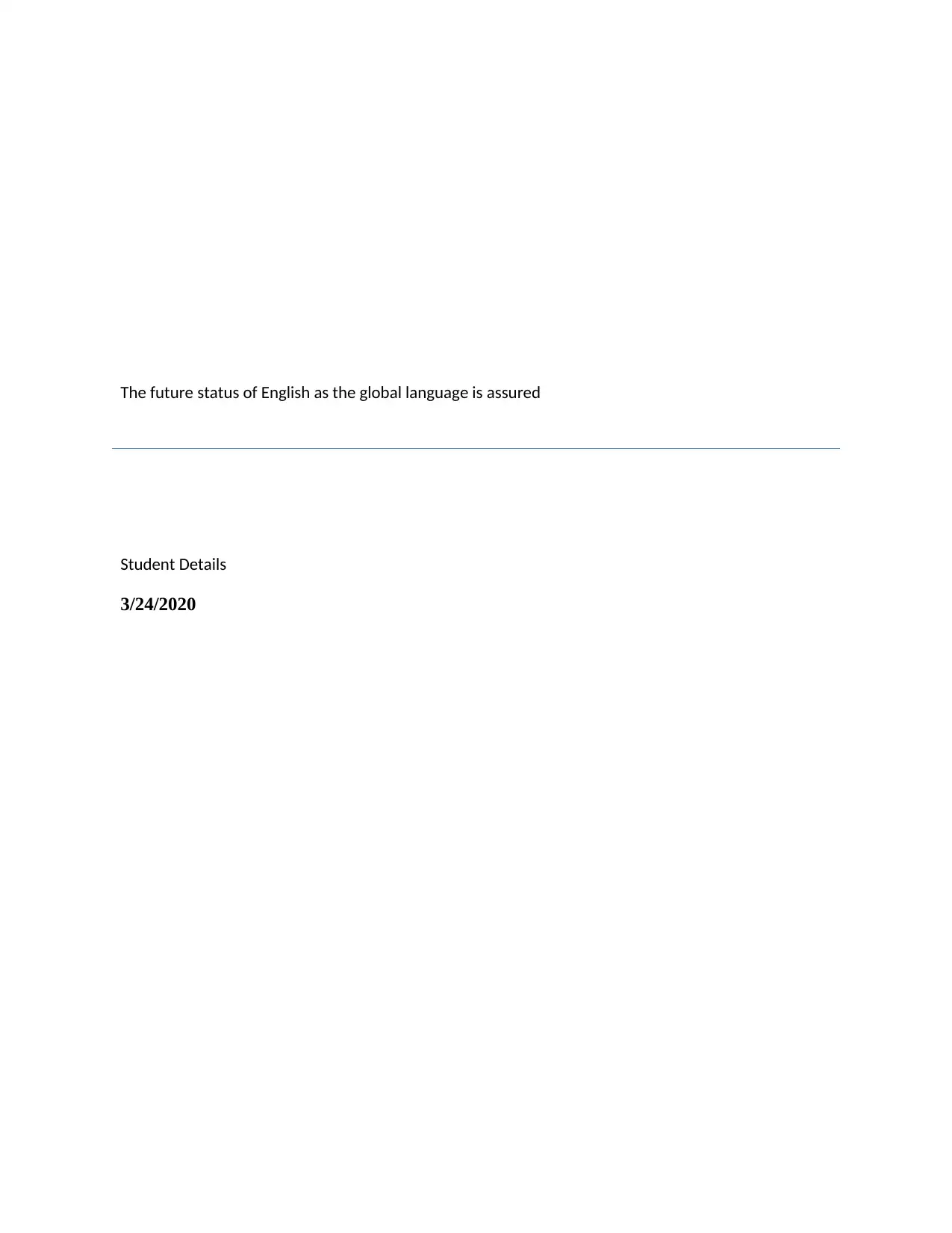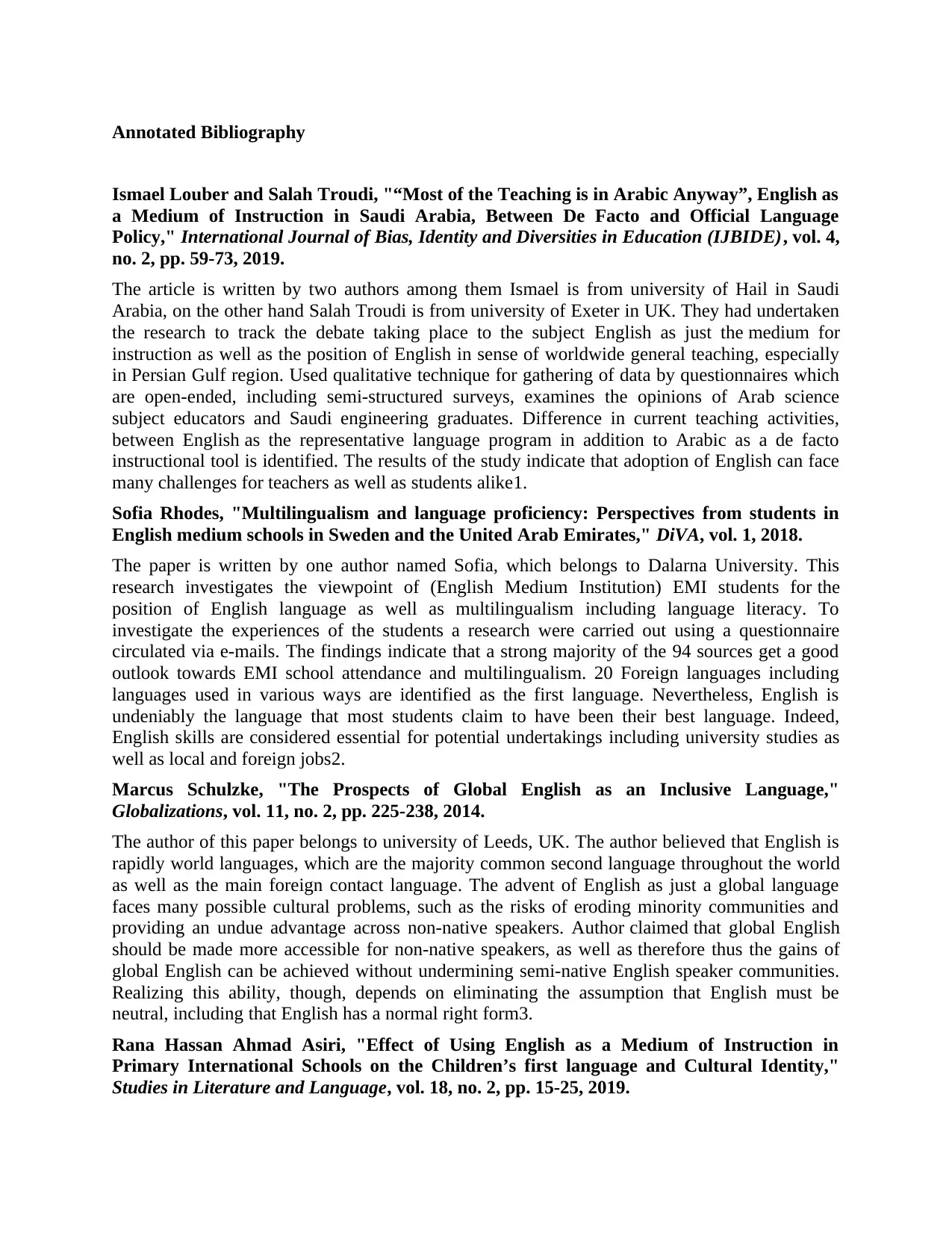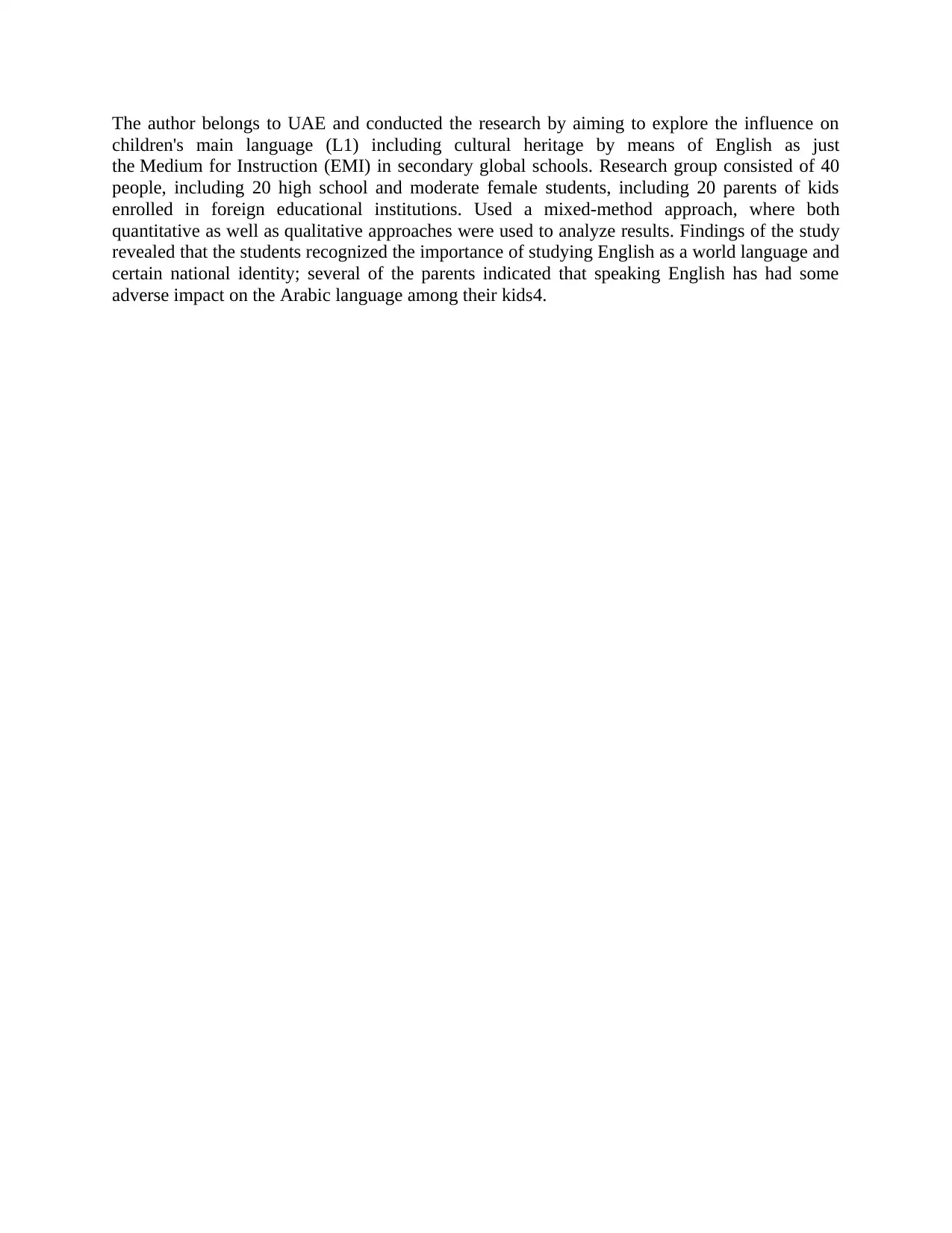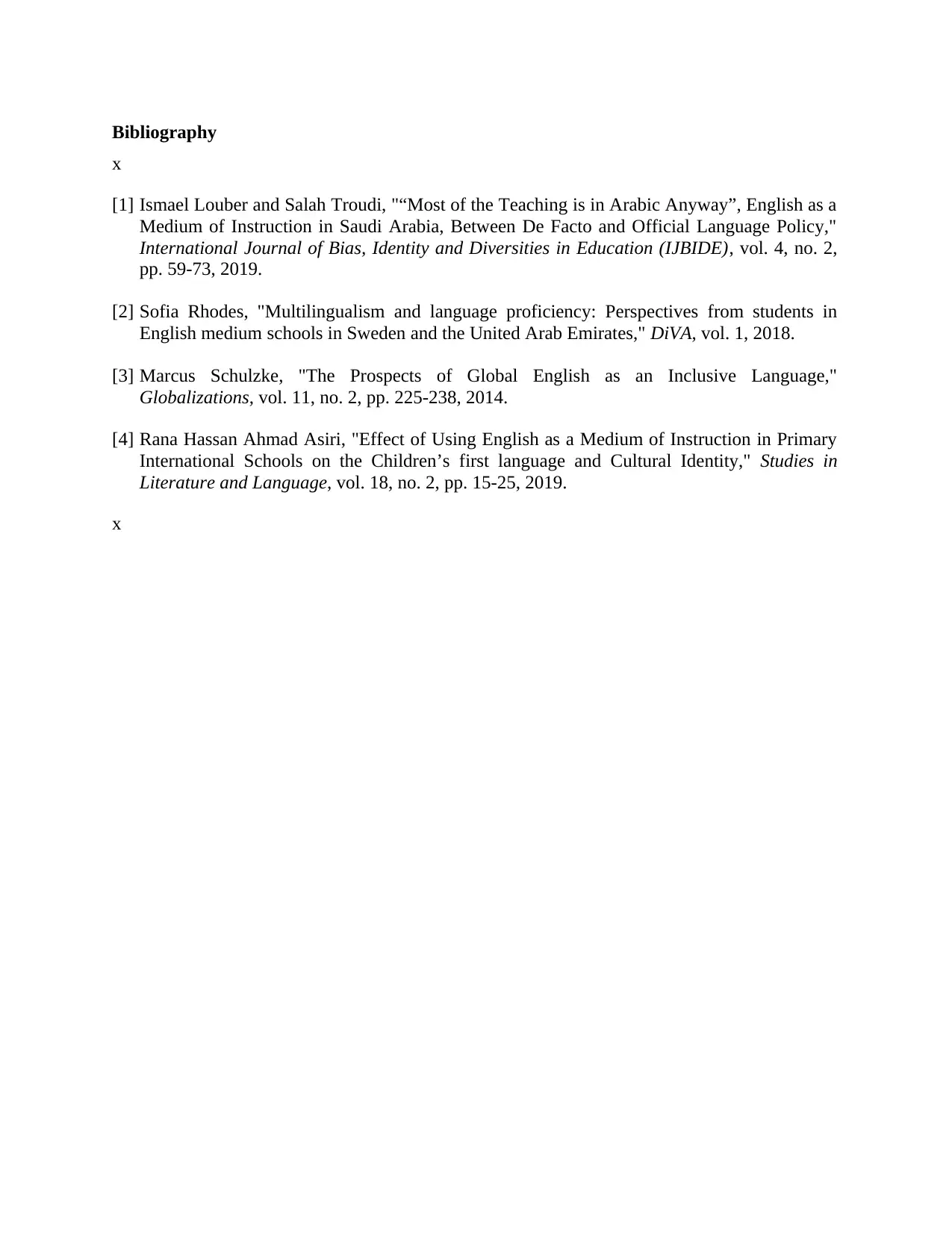Annotated Bibliography: English's Future as a Global Language
VerifiedAdded on 2022/08/29
|4
|961
|25
Annotated Bibliography
AI Summary
This annotated bibliography examines the future status of English as a global language, as assured. It includes four sources, two supporting and two opposing the statement. The sources are annotated to identify main ideas and evidence, adhering to the IEEE style for citations. Louber and Troudi's article explores English as a medium of instruction in Saudi Arabia, while Rhodes investigates student perspectives on English medium schools. Schulzke discusses the prospects of global English, and Asiri examines the impact of English on children's first language and cultural identity. The annotations provide concise summaries of each text, highlighting key arguments and findings to provide a comprehensive overview of the topic.

The future status of English as the global language is assured
Student Details
3/24/2020
Student Details
3/24/2020
Paraphrase This Document
Need a fresh take? Get an instant paraphrase of this document with our AI Paraphraser

Annotated Bibliography
Ismael Louber and Salah Troudi, "“Most of the Teaching is in Arabic Anyway”, English as
a Medium of Instruction in Saudi Arabia, Between De Facto and Official Language
Policy," International Journal of Bias, Identity and Diversities in Education (IJBIDE), vol. 4,
no. 2, pp. 59-73, 2019.
The article is written by two authors among them Ismael is from university of Hail in Saudi
Arabia, on the other hand Salah Troudi is from university of Exeter in UK. They had undertaken
the research to track the debate taking place to the subject English as just the medium for
instruction as well as the position of English in sense of worldwide general teaching, especially
in Persian Gulf region. Used qualitative technique for gathering of data by questionnaires which
are open-ended, including semi-structured surveys, examines the opinions of Arab science
subject educators and Saudi engineering graduates. Difference in current teaching activities,
between English as the representative language program in addition to Arabic as a de facto
instructional tool is identified. The results of the study indicate that adoption of English can face
many challenges for teachers as well as students alike1.
Sofia Rhodes, "Multilingualism and language proficiency: Perspectives from students in
English medium schools in Sweden and the United Arab Emirates," DiVA, vol. 1, 2018.
The paper is written by one author named Sofia, which belongs to Dalarna University. This
research investigates the viewpoint of (English Medium Institution) EMI students for the
position of English language as well as multilingualism including language literacy. To
investigate the experiences of the students a research were carried out using a questionnaire
circulated via e-mails. The findings indicate that a strong majority of the 94 sources get a good
outlook towards EMI school attendance and multilingualism. 20 Foreign languages including
languages used in various ways are identified as the first language. Nevertheless, English is
undeniably the language that most students claim to have been their best language. Indeed,
English skills are considered essential for potential undertakings including university studies as
well as local and foreign jobs2.
Marcus Schulzke, "The Prospects of Global English as an Inclusive Language,"
Globalizations, vol. 11, no. 2, pp. 225-238, 2014.
The author of this paper belongs to university of Leeds, UK. The author believed that English is
rapidly world languages, which are the majority common second language throughout the world
as well as the main foreign contact language. The advent of English as just a global language
faces many possible cultural problems, such as the risks of eroding minority communities and
providing an undue advantage across non-native speakers. Author claimed that global English
should be made more accessible for non-native speakers, as well as therefore thus the gains of
global English can be achieved without undermining semi-native English speaker communities.
Realizing this ability, though, depends on eliminating the assumption that English must be
neutral, including that English has a normal right form3.
Rana Hassan Ahmad Asiri, "Effect of Using English as a Medium of Instruction in
Primary International Schools on the Children’s first language and Cultural Identity,"
Studies in Literature and Language, vol. 18, no. 2, pp. 15-25, 2019.
Ismael Louber and Salah Troudi, "“Most of the Teaching is in Arabic Anyway”, English as
a Medium of Instruction in Saudi Arabia, Between De Facto and Official Language
Policy," International Journal of Bias, Identity and Diversities in Education (IJBIDE), vol. 4,
no. 2, pp. 59-73, 2019.
The article is written by two authors among them Ismael is from university of Hail in Saudi
Arabia, on the other hand Salah Troudi is from university of Exeter in UK. They had undertaken
the research to track the debate taking place to the subject English as just the medium for
instruction as well as the position of English in sense of worldwide general teaching, especially
in Persian Gulf region. Used qualitative technique for gathering of data by questionnaires which
are open-ended, including semi-structured surveys, examines the opinions of Arab science
subject educators and Saudi engineering graduates. Difference in current teaching activities,
between English as the representative language program in addition to Arabic as a de facto
instructional tool is identified. The results of the study indicate that adoption of English can face
many challenges for teachers as well as students alike1.
Sofia Rhodes, "Multilingualism and language proficiency: Perspectives from students in
English medium schools in Sweden and the United Arab Emirates," DiVA, vol. 1, 2018.
The paper is written by one author named Sofia, which belongs to Dalarna University. This
research investigates the viewpoint of (English Medium Institution) EMI students for the
position of English language as well as multilingualism including language literacy. To
investigate the experiences of the students a research were carried out using a questionnaire
circulated via e-mails. The findings indicate that a strong majority of the 94 sources get a good
outlook towards EMI school attendance and multilingualism. 20 Foreign languages including
languages used in various ways are identified as the first language. Nevertheless, English is
undeniably the language that most students claim to have been their best language. Indeed,
English skills are considered essential for potential undertakings including university studies as
well as local and foreign jobs2.
Marcus Schulzke, "The Prospects of Global English as an Inclusive Language,"
Globalizations, vol. 11, no. 2, pp. 225-238, 2014.
The author of this paper belongs to university of Leeds, UK. The author believed that English is
rapidly world languages, which are the majority common second language throughout the world
as well as the main foreign contact language. The advent of English as just a global language
faces many possible cultural problems, such as the risks of eroding minority communities and
providing an undue advantage across non-native speakers. Author claimed that global English
should be made more accessible for non-native speakers, as well as therefore thus the gains of
global English can be achieved without undermining semi-native English speaker communities.
Realizing this ability, though, depends on eliminating the assumption that English must be
neutral, including that English has a normal right form3.
Rana Hassan Ahmad Asiri, "Effect of Using English as a Medium of Instruction in
Primary International Schools on the Children’s first language and Cultural Identity,"
Studies in Literature and Language, vol. 18, no. 2, pp. 15-25, 2019.

The author belongs to UAE and conducted the research by aiming to explore the influence on
children's main language (L1) including cultural heritage by means of English as just
the Medium for Instruction (EMI) in secondary global schools. Research group consisted of 40
people, including 20 high school and moderate female students, including 20 parents of kids
enrolled in foreign educational institutions. Used a mixed-method approach, where both
quantitative as well as qualitative approaches were used to analyze results. Findings of the study
revealed that the students recognized the importance of studying English as a world language and
certain national identity; several of the parents indicated that speaking English has had some
adverse impact on the Arabic language among their kids4.
children's main language (L1) including cultural heritage by means of English as just
the Medium for Instruction (EMI) in secondary global schools. Research group consisted of 40
people, including 20 high school and moderate female students, including 20 parents of kids
enrolled in foreign educational institutions. Used a mixed-method approach, where both
quantitative as well as qualitative approaches were used to analyze results. Findings of the study
revealed that the students recognized the importance of studying English as a world language and
certain national identity; several of the parents indicated that speaking English has had some
adverse impact on the Arabic language among their kids4.
⊘ This is a preview!⊘
Do you want full access?
Subscribe today to unlock all pages.

Trusted by 1+ million students worldwide

Bibliography
x
[1] Ismael Louber and Salah Troudi, "“Most of the Teaching is in Arabic Anyway”, English as a
Medium of Instruction in Saudi Arabia, Between De Facto and Official Language Policy,"
International Journal of Bias, Identity and Diversities in Education (IJBIDE), vol. 4, no. 2,
pp. 59-73, 2019.
[2] Sofia Rhodes, "Multilingualism and language proficiency: Perspectives from students in
English medium schools in Sweden and the United Arab Emirates," DiVA, vol. 1, 2018.
[3] Marcus Schulzke, "The Prospects of Global English as an Inclusive Language,"
Globalizations, vol. 11, no. 2, pp. 225-238, 2014.
[4] Rana Hassan Ahmad Asiri, "Effect of Using English as a Medium of Instruction in Primary
International Schools on the Children’s first language and Cultural Identity," Studies in
Literature and Language, vol. 18, no. 2, pp. 15-25, 2019.
x
x
[1] Ismael Louber and Salah Troudi, "“Most of the Teaching is in Arabic Anyway”, English as a
Medium of Instruction in Saudi Arabia, Between De Facto and Official Language Policy,"
International Journal of Bias, Identity and Diversities in Education (IJBIDE), vol. 4, no. 2,
pp. 59-73, 2019.
[2] Sofia Rhodes, "Multilingualism and language proficiency: Perspectives from students in
English medium schools in Sweden and the United Arab Emirates," DiVA, vol. 1, 2018.
[3] Marcus Schulzke, "The Prospects of Global English as an Inclusive Language,"
Globalizations, vol. 11, no. 2, pp. 225-238, 2014.
[4] Rana Hassan Ahmad Asiri, "Effect of Using English as a Medium of Instruction in Primary
International Schools on the Children’s first language and Cultural Identity," Studies in
Literature and Language, vol. 18, no. 2, pp. 15-25, 2019.
x
1 out of 4
Your All-in-One AI-Powered Toolkit for Academic Success.
+13062052269
info@desklib.com
Available 24*7 on WhatsApp / Email
![[object Object]](/_next/static/media/star-bottom.7253800d.svg)
Unlock your academic potential
Copyright © 2020–2026 A2Z Services. All Rights Reserved. Developed and managed by ZUCOL.
